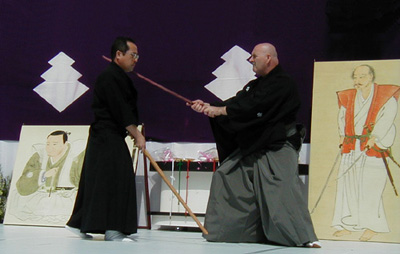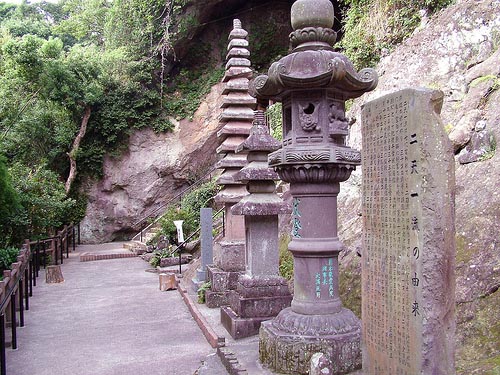

DOKKODO - Terao Magonojo - Genshin - Shoho (1645) Gogatsu 12 (May 12th) Shinmen Musashi |
Within the writings of Miyamoto Musashi creator of The Niten Ichi Ryu,we always find the Hyoho Sanjukajo (35 notes)
The Gorin-no-sho (Writings of the Five Elements) was written based on the Hyoho Sanjugokajo.
Dokkodo is actual fact a shorter version of Hyoho Sanjukajo and Gorin-no-sho and it contains all the meanings of method and philosophy of these writings. In the past, The writer Kan Kikuchi and Noaki Sanjugo discussed and had a disagreement over the matter of Miyamoto Musashi. Kikuchi’s comments on Musashi were, Amongst politicians, scholars and martial officers, how many people are like Musashi. I personally respect and nominate Musashi, as the number one swordsman. I also believe him to be a person foremost in general affairs. To me Musashi is an expert in human behavior and sword saint. As to his qualities as a human being he was one of the great artists and philosophers. He was also a great calligrapher. He was a person of such character that he should be regarded as a Human National Treasure.
 |
Another writer Ryotaro Shiba stated wrote a book called Shisetsu Miyamoto Musashi (The true story of Miyamoto Musashi). He wrote, how the great Musashi’s sculpture, painting, philosophy and logic stands out loud and clear. The best three nominations for famous writings before the Meiji era were the Gorin-no-sho. Tanni-sho - Notes lamenting differences and Hakkutsu-no-Gobunsho - Stories of a Skeleton. There is no authors name in any of the Tanni-sho texts. The problem of authorship has concerned scholars of Shin Buddhism for centuries. Several different opinions suggest three possible authors: Nyoshin (1239-1300) Kakunyo (1270-1351) or Yuien (Direct disciple of Shinran). Musashi sensei's Gorin-no-sho has been acclaimed as a highly advanced writing equal to the sacredness of Buddhism. This signifies that Gorin-no-sho is not only a martial text but is quite adequate as a Buddhist evaluation. It counterparts Tann-i-sho and Hakkotsu-no-gobunsho. This is the reason why Kan Kikuchi declared Musashi as one of the greatest philosophers in history. |
To study Dokkodo, and comprehend is meaning and quality, it is necessary to understand the awakening of the heart which is written at the beginning of Gorin-no-sho. According to writings in the Niten-Ki, Musashi had been taken ill and was receiving treatment at his residence which was within Chiba Jo (castle). On the 12th May in the year of Shoho (1645), seven days before he passed away he presented certain articles to close friends and followers. He asked these close friends to employ students who had no work to give them security. He then completed writing Dokkodo without fear or hesitation, with a clean, clear mind. In the historical document Niten-Ki there are nineteen phrases. Two more as written in Dokkodo are missing.
![]() Mi o asaku omoi, yo wo fukau omou (see number four)
Mi o asaku omoi, yo wo fukau omou (see number four)
![]() Mi o sutetemo myori wa sutezu.
Mi o sutetemo myori wa sutezu.
The Niten-Ki is dated 12th May Shoho (1645), is signed Shinmen Musashi Gensai but has no forwarding address. In the original Dokkodo document there are twenty one phrases. This in fact was the only document left by Musashi. It was addressed to his lineal student Magonojo Terao and is esoteric in intimating to students how they should go about studying and investigating in their lives.
Dokkodo was written and left as a message to future followers. The message within is dependent upon the individual readers own level of understanding. Musashi was a great philosopher, National Human Treasure and an enlightened individual. The twenty-one phrases are structured in order of superiority with a quality equal to the famous Tanni-sho. Between the first paragraph Yoyo no Michiwo Somukukoto Nashi; In no way should one act contrary to the great future you have before you. Below is a summary of the basic meanings. The following pages look at the meanings in more detail drawing on Buddhist precepts.
The last, Tsuneni Hyoho no michi o Hanarazu: Never part from the way of Hyoho is contained the will which Musashi wanted to hand on to his followers before he passed on.
There are in all 21 precepts. I have left out a detailed description of some, as to me they are self explanatory.
 |
:
Iko no kokoro nashi also means Satto jizai. Satto means one’s homeland or motherland. The possibility effortless birth. |
![]() Mi o asaku omoi yo o fu kaku omou - Consider your superficiality and have profound thoughts for others.
Mi o asaku omoi yo o fu kaku omou - Consider your superficiality and have profound thoughts for others.
|
 |
![]() Jita tomoni urami kakotsu kokoro nashi - There should be no thought of bearing a grudge against each other.
Jita tomoni urami kakotsu kokoro nashi - There should be no thought of bearing a grudge against each other.
![]() Rembo no michi omoi kokoro nashi - There is no time for thinking about a love life..
Rembo no michi omoi kokoro nashi - There is no time for thinking about a love life..
![]() Mono goto ni suki konomu koto nashi - One should not have like or dislikes for things.
Mono goto ni suki konomu koto nashi - One should not have like or dislikes for things.
![]() Shitaku ni oite nosomu koto nashi - Do not have preference to a particular domicile.
Shitaku ni oite nosomu koto nashi - Do not have preference to a particular domicile.
![]() Mi hitotsuni bishoku o konomazu - As to the choice of delicious food with relation to society in general.
Mi hitotsuni bishoku o konomazu - As to the choice of delicious food with relation to society in general.
![]() Dai mono naru furuki dogu shoji sezu - One should never let future generations become attached to old weapons.
Dai mono naru furuki dogu shoji sezu - One should never let future generations become attached to old weapons.
![]() Issho no aida yokoshin omoazu - Forget about human desire.
Issho no aida yokoshin omoazu - Forget about human desire.
![]() Wagami ni itari monoimi suru koto nashi - One should avoid superstition and taboo.
Wagami ni itari monoimi suru koto nashi - One should avoid superstition and taboo.
![]() Dai mono naru furuki dogu shojisezu - To use equipment that you consider important and not to keep that which is of no use.
Dai mono naru furuki dogu shojisezu - To use equipment that you consider important and not to keep that which is of no use.
![]() Michi ni oite wa shi o itowazu omou - Follow your way with preparedness for death
Michi ni oite wa shi o itowazu omou - Follow your way with preparedness for death
![]() Roshin ni zaiho shoryo mochiyuru shoryo ni kokoro nashi - As you get old your gained possessions are not of great importance.
Roshin ni zaiho shoryo mochiyuru shoryo ni kokoro nashi - As you get old your gained possessions are not of great importance.
![]() Bushin wa totoshi bushin o tanomazu - Respect the Gods and Buddha but do not count on them.
Bushin wa totoshi bushin o tanomazu - Respect the Gods and Buddha but do not count on them.
![]() Mi o sutetomo myori wa sutezu - Do not abandon your good name, even if it means abandoning your own life.
Mi o sutetomo myori wa sutezu - Do not abandon your good name, even if it means abandoning your own life.
![]() Tsune ni hyoho no michi wo hanerazu - Do not stray from the path of Hyoho.
Tsune ni hyoho no michi wo hanerazu - Do not stray from the path of Hyoho.
 |
Path leading to Reigando - Alexander Bradshaw 2005 |
Hyakutake-Watkin ©1992
